|
-Y-
Yatha Sidhra - "A Meditation Mass" (Brain 1973)
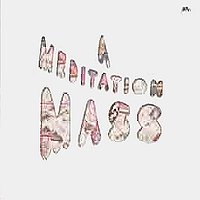 As the title states, Yatha Sidhra's only album is a very meditative and mostly peaceful work. It consisted of one album-length suite in four parts which all float together. It is possible that the album gave some inspiration for Jade Warrior during their period on Island (which also happens to be their best period in my opinion), but Yatha Sidhra's music was definitively less developed and without the melodic sense of Jade Warrior. The album opens with the electric guitar fading slowly in and together with the tablas creating the underlying foundation for most of the piece. The most dominant instrument is undoubtedly Peter Elbracht's flute that in an otherworldly and ethereal way improvises its way through most of the album. He is soon joined by Rolf Ficther's shimmering Moog and very dreamy vocals. They do however not last for long, as a vibraphone solo appears and brings the first part to an end. The second and shortest part of the suite introduces some el-piano to the sound, but the flute is again quickly taking centre stage in the music. The band goes into rock-mood on the third part, which is mostly a jazzy/bluesy electric jam of the kind that many krautrock bands had several of. The fourth and final part is basically a repetition of the first, but shorter and more tightly edited. "A Meditation Mass" makes some good relaxation music with its hypnotic structures and dreamy sound, and comes recommended for anyone looking for that. As the title states, Yatha Sidhra's only album is a very meditative and mostly peaceful work. It consisted of one album-length suite in four parts which all float together. It is possible that the album gave some inspiration for Jade Warrior during their period on Island (which also happens to be their best period in my opinion), but Yatha Sidhra's music was definitively less developed and without the melodic sense of Jade Warrior. The album opens with the electric guitar fading slowly in and together with the tablas creating the underlying foundation for most of the piece. The most dominant instrument is undoubtedly Peter Elbracht's flute that in an otherworldly and ethereal way improvises its way through most of the album. He is soon joined by Rolf Ficther's shimmering Moog and very dreamy vocals. They do however not last for long, as a vibraphone solo appears and brings the first part to an end. The second and shortest part of the suite introduces some el-piano to the sound, but the flute is again quickly taking centre stage in the music. The band goes into rock-mood on the third part, which is mostly a jazzy/bluesy electric jam of the kind that many krautrock bands had several of. The fourth and final part is basically a repetition of the first, but shorter and more tightly edited. "A Meditation Mass" makes some good relaxation music with its hypnotic structures and dreamy sound, and comes recommended for anyone looking for that.
Yes - "Yes" (Atlantic 1969)
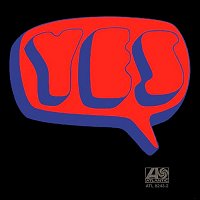 Although Yes' debut-album is not exactly what they're remembered most for, it's still a decent piece of proto-prog. From quite obvious reasons this is also their most 60's influenced album. Two of the tracks, "Beyond and Before" and "Sweetness" dates back from the time when Anderson and Squire were in a band called Mabel Greer's Toyshop. Some of the Yes-trademarks can already been heard here, like the falsetto vocal-harmonies and the powerful and distinctive bass-playing of Squire. But it's of course a much more basic and rougher album then their symphonic progressive rock classics from the 70's. "Survival" remains the classic track from this album, and it's also the track with most glimpses of what Yes later would do. They also covered The Byrds' "I See You" and The Beatles' "Every Little Thing" in a very refreshing and convincing way. "Yesterday and Today" is a beautiful and atmospheric little tune, but the other ballad on the album ("Sweetness") is all to sweet and fluffy. "Looking Around" and "Beyond and Before" is a kind of a late 60's progressive power-pop driven by the excellent Hammond-work of Kaye and the gutsy guitar-playing of Peter Banks. "Harold Land" is another pretty tune with progressive tendencies and good melodies. "Yes" marked a decent starting point for a band that would become one of the greatest progressive rock bands ever. Although Yes' debut-album is not exactly what they're remembered most for, it's still a decent piece of proto-prog. From quite obvious reasons this is also their most 60's influenced album. Two of the tracks, "Beyond and Before" and "Sweetness" dates back from the time when Anderson and Squire were in a band called Mabel Greer's Toyshop. Some of the Yes-trademarks can already been heard here, like the falsetto vocal-harmonies and the powerful and distinctive bass-playing of Squire. But it's of course a much more basic and rougher album then their symphonic progressive rock classics from the 70's. "Survival" remains the classic track from this album, and it's also the track with most glimpses of what Yes later would do. They also covered The Byrds' "I See You" and The Beatles' "Every Little Thing" in a very refreshing and convincing way. "Yesterday and Today" is a beautiful and atmospheric little tune, but the other ballad on the album ("Sweetness") is all to sweet and fluffy. "Looking Around" and "Beyond and Before" is a kind of a late 60's progressive power-pop driven by the excellent Hammond-work of Kaye and the gutsy guitar-playing of Peter Banks. "Harold Land" is another pretty tune with progressive tendencies and good melodies. "Yes" marked a decent starting point for a band that would become one of the greatest progressive rock bands ever.
Yes - "Time and a Word" (Atlantic 1970)
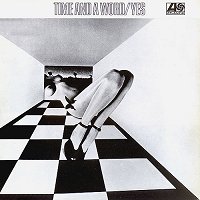 Yes' second album (and the last with original guitarist Peter Banks) was the first where the band began to move into a more symphonic direction. They even hired a small orchestra to prove the point. Although their sound was still under development there was already plenty of excellent progressive rock to enjoy here. "Then", "Astral Traveller" and "Sweet Dreams" were all among the best tracks from very early Yes. The sound on the album is dominated a lot by the tasty Hammond-work from Tony Kaye and the orchestral arrangements works fine in my ears. The beautiful title-track was the only track from the first two albums that would remain in their live-set for years to come, while "The Prophet" has a delightful fairytale-atmosphere. And just as with the first album, "Time and a Word" also included two cover-versions. First there was a very tight and "yesified" version of Richie Haven's "No Opportunity Necessary, No Experience Needed" and an atmospheric version of Steven Still's "Everydays" with an incredible instrumental-part in the middle. Yes still had some more steps to go before they would reach their creative highlights and definitive masterpieces, but "Time and a Word" is a good piece of early 70's progressive rock anyway. Yes' second album (and the last with original guitarist Peter Banks) was the first where the band began to move into a more symphonic direction. They even hired a small orchestra to prove the point. Although their sound was still under development there was already plenty of excellent progressive rock to enjoy here. "Then", "Astral Traveller" and "Sweet Dreams" were all among the best tracks from very early Yes. The sound on the album is dominated a lot by the tasty Hammond-work from Tony Kaye and the orchestral arrangements works fine in my ears. The beautiful title-track was the only track from the first two albums that would remain in their live-set for years to come, while "The Prophet" has a delightful fairytale-atmosphere. And just as with the first album, "Time and a Word" also included two cover-versions. First there was a very tight and "yesified" version of Richie Haven's "No Opportunity Necessary, No Experience Needed" and an atmospheric version of Steven Still's "Everydays" with an incredible instrumental-part in the middle. Yes still had some more steps to go before they would reach their creative highlights and definitive masterpieces, but "Time and a Word" is a good piece of early 70's progressive rock anyway.
Yes - "The Yes Album" (Atlantic 1971)
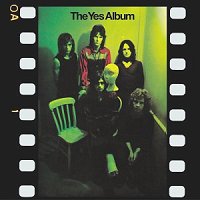 Yes took a major step forward when Peter Banks was replaced by Steve Howe in 1971. Their first album with Howe was also their first classic one, so the title "The Yes Album" was no coincidence. Yes had found most of their trademark sound and style here, and 2/3 of the material on the album would make an important part in their live-set. The album opens with the superb "Yours is no Disgrace" and this track really proved that Yes now had become one of the greatest progressive rock bands ever. It featured powerful riffs, complex instrumental-parts, excellent organ and synth-work from Kaye and Howe's playing varies from tasteful and atmospheric to raw and energetic. Howe's acoustic instrumental "Clap" (wrongly titled as "The Clap" on the cover) also allowed him to demonstrate his unique style of playing. "Starship Trooper" was the first Yes-track divided into several parts and included the legendary riff of the closing-part "Würm". "I've Seen All Good People" combined the lovely and atmospheric acoustic part called "Your Move" with the rocking energy of "All People" and demonstrated Yes' phenomenal dynamics very well. "Perpetual Change" was yet another very strong and complex track. "The Yes Album" was Yes' first truly essential piece of work. Yes took a major step forward when Peter Banks was replaced by Steve Howe in 1971. Their first album with Howe was also their first classic one, so the title "The Yes Album" was no coincidence. Yes had found most of their trademark sound and style here, and 2/3 of the material on the album would make an important part in their live-set. The album opens with the superb "Yours is no Disgrace" and this track really proved that Yes now had become one of the greatest progressive rock bands ever. It featured powerful riffs, complex instrumental-parts, excellent organ and synth-work from Kaye and Howe's playing varies from tasteful and atmospheric to raw and energetic. Howe's acoustic instrumental "Clap" (wrongly titled as "The Clap" on the cover) also allowed him to demonstrate his unique style of playing. "Starship Trooper" was the first Yes-track divided into several parts and included the legendary riff of the closing-part "Würm". "I've Seen All Good People" combined the lovely and atmospheric acoustic part called "Your Move" with the rocking energy of "All People" and demonstrated Yes' phenomenal dynamics very well. "Perpetual Change" was yet another very strong and complex track. "The Yes Album" was Yes' first truly essential piece of work.
Yes - "Fragile" (Atlantic 1971)
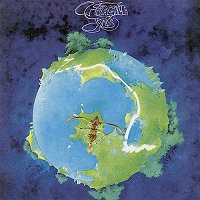 1971 was a turning point in Yes' career. They released their first truly classic LP with "The Yes Album", but even more important things happened later the same year. Tony Kaye left the band shortly after that album, and was replaced by new and upcoming keyboard wizard Rick Wakeman who proved to be the last piece in the puzzle of the ultimately best line-up of the band. Wakeman were technically far superior to Kaye, and also used a much broader palette of sounds and keyboards, including Mellotron, Moog and harpsichord in addition to the obligatory organ. The first album from this line-up, "Fragile", left no doubt about Yes' new status as now definitively belonging in the first division of progressive rock. The album opened with the classic "Roundabout". Driven forward by Howe's acoustic guitar riff, Squire's superb bass, Anderson's catchy vocal-lines and newcomer Wakeman's colourful keyboards, "Roundabout" was the definitive progressive rock hit song, catchy enough to appeal even to the mainstream but at the same also complex and demanding enough to keep the progressive rock listener satisfied. "South Side of the Sky" is one of the band's most overlooked gems, showing them almost in heavy-prog mode, but also featuring a beautiful and very typical Yes-chorale in the middle dominated by Squire and Anderson's vocal harmonizing. "Long Distance Runaround" would prove to become one of the favourites from the album, even if this light but sophisticated and cheerful jazzy pop was rather unusual for Yes. And last but not at least we had "Heart of the Sunrise" that in my opinion has to be one of the ten best progressive rock compositions of all time. Alternating between aggressive riffs, beautiful and passionate vocal melodies, sweeping symphonic passages dominated by Wakeman's Mellotron and complex and technically insanely demanding instrumental bits, this is classic, '70s symphonic progressive rock at its best in a nutshell. Utter essential listening. But the record also gave room for a short solo-piece from each of the five members. Wakeman did a little thing based on Brahms in "Cans and Brahms", Anderson experimented with overdubbed vocal-harmonies in "We Have Heaven" and Bruford delivered 35 rhythmically very complicated seconds in "Five Per Cent for Nothing". The two best-known of these solo-piece were however Squire's legendary bass-solo "The Fish (Schindleria Praematurus)" and Howe's "Mood for a Day" that next to "Clap" was his most beloved acoustic piece. "Fragile" also added another important trademark with Roger Dean's fantastic fantasy-art, the final element that made the whole concept of Yes complete. "Fragile" was the best progressive rock record of 1971. 1971 was a turning point in Yes' career. They released their first truly classic LP with "The Yes Album", but even more important things happened later the same year. Tony Kaye left the band shortly after that album, and was replaced by new and upcoming keyboard wizard Rick Wakeman who proved to be the last piece in the puzzle of the ultimately best line-up of the band. Wakeman were technically far superior to Kaye, and also used a much broader palette of sounds and keyboards, including Mellotron, Moog and harpsichord in addition to the obligatory organ. The first album from this line-up, "Fragile", left no doubt about Yes' new status as now definitively belonging in the first division of progressive rock. The album opened with the classic "Roundabout". Driven forward by Howe's acoustic guitar riff, Squire's superb bass, Anderson's catchy vocal-lines and newcomer Wakeman's colourful keyboards, "Roundabout" was the definitive progressive rock hit song, catchy enough to appeal even to the mainstream but at the same also complex and demanding enough to keep the progressive rock listener satisfied. "South Side of the Sky" is one of the band's most overlooked gems, showing them almost in heavy-prog mode, but also featuring a beautiful and very typical Yes-chorale in the middle dominated by Squire and Anderson's vocal harmonizing. "Long Distance Runaround" would prove to become one of the favourites from the album, even if this light but sophisticated and cheerful jazzy pop was rather unusual for Yes. And last but not at least we had "Heart of the Sunrise" that in my opinion has to be one of the ten best progressive rock compositions of all time. Alternating between aggressive riffs, beautiful and passionate vocal melodies, sweeping symphonic passages dominated by Wakeman's Mellotron and complex and technically insanely demanding instrumental bits, this is classic, '70s symphonic progressive rock at its best in a nutshell. Utter essential listening. But the record also gave room for a short solo-piece from each of the five members. Wakeman did a little thing based on Brahms in "Cans and Brahms", Anderson experimented with overdubbed vocal-harmonies in "We Have Heaven" and Bruford delivered 35 rhythmically very complicated seconds in "Five Per Cent for Nothing". The two best-known of these solo-piece were however Squire's legendary bass-solo "The Fish (Schindleria Praematurus)" and Howe's "Mood for a Day" that next to "Clap" was his most beloved acoustic piece. "Fragile" also added another important trademark with Roger Dean's fantastic fantasy-art, the final element that made the whole concept of Yes complete. "Fragile" was the best progressive rock record of 1971.
Label
Yes - "Close to the Edge" (Atlantic 1972)
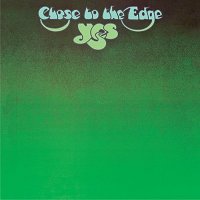 Considering its enormous qualities, it's a bit surprising that "Fragile" was recorded and written in a short amount of time, and was mostly a result of the spontaneous creative energy coming from a band who were enthusiastic and overwhelmed by their own newly discovered chemistry. So for the follow-up, the band could focus, concentrate and take all the time they needed to get the ultimately best out of their collective creative and artistic forces. And it worked beyond every expectation, as the band in three months managed to create the definitive progressive rock album in "Close to the Edge". Now that's one hell of a claim, but listening to this masterpiece for many years has made me sure it's the case. The 18-minute title-track is perhaps the most perfectly composed and structured side-long composition from a progressive rock band. How many other tracks of such length can be said to be one seamless continuous song where the main part is based around a verse/chorus-structure? Very few, as most of them really consists of several songs and pieces tied together to a whole, but ”Close to the Edge” works as really ONE long song the whole way through. It opens with the sounds of birds and cascading water, introducing the summery feel that pervades the entire album, before exploding into a chaotic and powerful instrumental section that indeed is one of the most effective and unexpected openings of any progressive rock epic. It then calms down to one of the many beautiful main melodies of the piece, played wonderfully by Howe with the rest of the band wrapping it up in an atmospheric and pleasant carpet of sound. The track has actually two different verses; one quite rocking with a superb mid-tempo groove while the other one has the perhaps most dominant and important melody in the track. The chorus is really tasteful and played in several different ways. The section named ”I Get Up, I Get Down” is one of the most mystical and atmospheric passages Yes ever recorded. It gives a feeling of being in a Roger Dean-designed cave, and builds slowly up to Wakeman’s superb-grandiose keyboard-fanfare that leads into one of his best and most recognizable organ-solos ever. The band then returns to both the verses and chorus again, now sounding grander and more beautiful than ever before, making it one of the most overwhelming finales in progressive rock history. Simply fantastic. This almost inhuman degree of quality is unbelievable enough also brought over in the two tracks that take up the second side. ”And You And I” is yet another one of Yes’ most beautiful, grandiose and symphonic pieces. Starting up as an airy acoustic track surrounded by Wakeman’s wonderful Moogs and a simple yet BIG melody, before going through several changes and some of the grandest Mellotron-orgasms ever put on vinyl. ”And you and I climb, crossing the shapes of the morning/And you and I reach over the sun for the river/And you and I climb, clearer, towards the movement/And you and I called over valleys of endless seas”. Pure and utter timeless magic. This stuff will in several hundred years be remembered as some of the greatest music that was made in the 20th century, hopelessly misunderstood, overlooked and underrated by the mainly musically braindead people of its age. ”Siberian Khatru” is in many ways this album’s ”Roundabout”, being a quite catchy and rocking tune, but still with a quirky, progressive and symphonic edge. You’re something of a joke if you claim to enjoy music without owning this album. Considering its enormous qualities, it's a bit surprising that "Fragile" was recorded and written in a short amount of time, and was mostly a result of the spontaneous creative energy coming from a band who were enthusiastic and overwhelmed by their own newly discovered chemistry. So for the follow-up, the band could focus, concentrate and take all the time they needed to get the ultimately best out of their collective creative and artistic forces. And it worked beyond every expectation, as the band in three months managed to create the definitive progressive rock album in "Close to the Edge". Now that's one hell of a claim, but listening to this masterpiece for many years has made me sure it's the case. The 18-minute title-track is perhaps the most perfectly composed and structured side-long composition from a progressive rock band. How many other tracks of such length can be said to be one seamless continuous song where the main part is based around a verse/chorus-structure? Very few, as most of them really consists of several songs and pieces tied together to a whole, but ”Close to the Edge” works as really ONE long song the whole way through. It opens with the sounds of birds and cascading water, introducing the summery feel that pervades the entire album, before exploding into a chaotic and powerful instrumental section that indeed is one of the most effective and unexpected openings of any progressive rock epic. It then calms down to one of the many beautiful main melodies of the piece, played wonderfully by Howe with the rest of the band wrapping it up in an atmospheric and pleasant carpet of sound. The track has actually two different verses; one quite rocking with a superb mid-tempo groove while the other one has the perhaps most dominant and important melody in the track. The chorus is really tasteful and played in several different ways. The section named ”I Get Up, I Get Down” is one of the most mystical and atmospheric passages Yes ever recorded. It gives a feeling of being in a Roger Dean-designed cave, and builds slowly up to Wakeman’s superb-grandiose keyboard-fanfare that leads into one of his best and most recognizable organ-solos ever. The band then returns to both the verses and chorus again, now sounding grander and more beautiful than ever before, making it one of the most overwhelming finales in progressive rock history. Simply fantastic. This almost inhuman degree of quality is unbelievable enough also brought over in the two tracks that take up the second side. ”And You And I” is yet another one of Yes’ most beautiful, grandiose and symphonic pieces. Starting up as an airy acoustic track surrounded by Wakeman’s wonderful Moogs and a simple yet BIG melody, before going through several changes and some of the grandest Mellotron-orgasms ever put on vinyl. ”And you and I climb, crossing the shapes of the morning/And you and I reach over the sun for the river/And you and I climb, clearer, towards the movement/And you and I called over valleys of endless seas”. Pure and utter timeless magic. This stuff will in several hundred years be remembered as some of the greatest music that was made in the 20th century, hopelessly misunderstood, overlooked and underrated by the mainly musically braindead people of its age. ”Siberian Khatru” is in many ways this album’s ”Roundabout”, being a quite catchy and rocking tune, but still with a quirky, progressive and symphonic edge. You’re something of a joke if you claim to enjoy music without owning this album.
Label
Yes - "Yessongs" (Atlantic 1973)
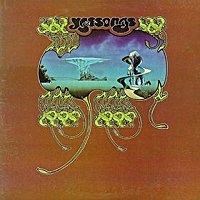 Bill Bruford left Yes shortly after "Close to the Edge" to join King Crimson. Alan White replaced him, but Bruford can still be heard on a few tracks on the triple live-album "Yessongs". The album features most of the material from the three previous albums and stands as one of progressive rock's best live-albums ever. The performances are extremely tight and energetic, and that's really impressive when you think about the complexity of the material. The versions of "Close to the Edge", "Roundabout", "Perpetual Change" and "Yours is no Disgrace" bursts with power and energy and proved beyond any doubt that Yes was one of the strongest live-bands among the progressive rock bands. The addition of Wakeman's mellotron on the tracks from "The Yes Album" is also a very pleasant feature. However, White's drumming on "Heart of the Sunrise" proved that he was absolutely no rival to Bruford, but I guess you couldn't expect him to be that either. We're also getting a medley of themes from Wakeman's solo-debut "The Six Wives of Henry VIII" mixed in with some excerpts from Handel's "Messiah" played on mellotron! "Yessongs" is essential if you like live-albums and Roger Dean's fantastic and VERY large fold-out sleeve is almost worth the price alone, but you should of course get the original versions of the songs first. Bill Bruford left Yes shortly after "Close to the Edge" to join King Crimson. Alan White replaced him, but Bruford can still be heard on a few tracks on the triple live-album "Yessongs". The album features most of the material from the three previous albums and stands as one of progressive rock's best live-albums ever. The performances are extremely tight and energetic, and that's really impressive when you think about the complexity of the material. The versions of "Close to the Edge", "Roundabout", "Perpetual Change" and "Yours is no Disgrace" bursts with power and energy and proved beyond any doubt that Yes was one of the strongest live-bands among the progressive rock bands. The addition of Wakeman's mellotron on the tracks from "The Yes Album" is also a very pleasant feature. However, White's drumming on "Heart of the Sunrise" proved that he was absolutely no rival to Bruford, but I guess you couldn't expect him to be that either. We're also getting a medley of themes from Wakeman's solo-debut "The Six Wives of Henry VIII" mixed in with some excerpts from Handel's "Messiah" played on mellotron! "Yessongs" is essential if you like live-albums and Roger Dean's fantastic and VERY large fold-out sleeve is almost worth the price alone, but you should of course get the original versions of the songs first.
Yes - "Tales from Topographic Oceans" (Atlantic 1973)
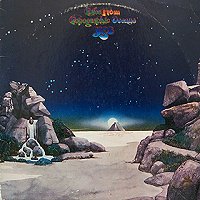 The important follow-up to "Close to the Edge" was not just Yes' most ambitious album, but probably the most ambitious record in rock history. "Tales from Topographic Oceans" was a double album inspired on a philosophy from Hinduism that divided life into four parts, and each side of the album represented one of those parts. Jon Anderson seriously believed that the album would convert the rest of the world to this philosophy, but as we all know it didn't, even if it was Yes' first LP to reach number one on the lists. So as you may have guessed now, the album consisted of four 20-minute songs that showed Yes from their ultimately most progressive side. The first track "The Revealing Science of God" is probably the best song on the album, and is in the same class as "Close to the Edge", stuffed with fine melodies and an overall cleverly cohesive and well-constructed structure, despite its long length. The first part of "The Remembering" mixes a laidback, almost folky melody with grandiose and sweeping passages from Wakeman that will return later in the song. The track transforms into a faster and more joyful pace in the middle, and gave name to the band's next album "Relayer". After two song based and tightly structured compositions we're in for some of Yes most' experimental music ever in the mostly instrumental "The Ancient". This compelling track goes from thundering riffs, symphonic and melodic passages and then to chaotic and noisy improvisations before ending in a pleasant acoustic song. Finally we get to the best-known track of the album in form of "Ritual", the only song from the record that would remain in their concert repertoire for a long time. The first minutes of it is mainly taken up by a catchy and cheerful vocal-theme before slowly transcending into the beautiful main melody. This is followed by a long solo section where Squire really is allowed to let loose before it goes into a very dramatic percussive part where the band always used to flash their lighting show when they performed it live. At the end it all calms down and returns to the main melody again, passionate and beautiful. "Tales from Topographic Oceans" is an atmospheric and mysterious world of its own that the listener can escape into. It's not an easy album to penetrate, but once you're in it you'll find it to be one of Yes' most fascinating works and definitively their most otherworldly one. But there were highly mixed opinions about it both from critics and fans. Wakeman was among those who didn't like the album, and he became so sick and tired of performing it on the tour that followed it that he finally left the band for the first time. The important follow-up to "Close to the Edge" was not just Yes' most ambitious album, but probably the most ambitious record in rock history. "Tales from Topographic Oceans" was a double album inspired on a philosophy from Hinduism that divided life into four parts, and each side of the album represented one of those parts. Jon Anderson seriously believed that the album would convert the rest of the world to this philosophy, but as we all know it didn't, even if it was Yes' first LP to reach number one on the lists. So as you may have guessed now, the album consisted of four 20-minute songs that showed Yes from their ultimately most progressive side. The first track "The Revealing Science of God" is probably the best song on the album, and is in the same class as "Close to the Edge", stuffed with fine melodies and an overall cleverly cohesive and well-constructed structure, despite its long length. The first part of "The Remembering" mixes a laidback, almost folky melody with grandiose and sweeping passages from Wakeman that will return later in the song. The track transforms into a faster and more joyful pace in the middle, and gave name to the band's next album "Relayer". After two song based and tightly structured compositions we're in for some of Yes most' experimental music ever in the mostly instrumental "The Ancient". This compelling track goes from thundering riffs, symphonic and melodic passages and then to chaotic and noisy improvisations before ending in a pleasant acoustic song. Finally we get to the best-known track of the album in form of "Ritual", the only song from the record that would remain in their concert repertoire for a long time. The first minutes of it is mainly taken up by a catchy and cheerful vocal-theme before slowly transcending into the beautiful main melody. This is followed by a long solo section where Squire really is allowed to let loose before it goes into a very dramatic percussive part where the band always used to flash their lighting show when they performed it live. At the end it all calms down and returns to the main melody again, passionate and beautiful. "Tales from Topographic Oceans" is an atmospheric and mysterious world of its own that the listener can escape into. It's not an easy album to penetrate, but once you're in it you'll find it to be one of Yes' most fascinating works and definitively their most otherworldly one. But there were highly mixed opinions about it both from critics and fans. Wakeman was among those who didn't like the album, and he became so sick and tired of performing it on the tour that followed it that he finally left the band for the first time.
Label
Yes - "Live at the Long Beach Arena, Calif. 3/19/74" (Pig's Eye 1974)
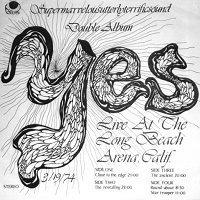 I've never been a big fan of bootlegs as I think it's natural to assume that the best live-recordings of a band are to be found on their own official live-albums. However, I've always been curios about how Yes performed "Tales from Topographic Oceans" on the tour for that LP. This double album recorded at the Long Beach Arena in America early in '74 gives us half the answer, as it features both "The Revealing Science of God" and "The Ancient". You'll have to tolerate some typically rotten bootleg-sound to be able to enjoy this, but if you get past that you'll have a rare opportunity to hear vintage performances of something else from "Tales from Topographic Oceans" than "Ritual". But the bootleg opens with "Close to the Edge", performed pretty much the same way as on "Yessongs". Funny to hear the talk among the audience during "I Get Up, I Get Down", revealing that the guy who taped this were standing far away from the stage. But we get over to the most interesting sides of the album when we reach "The Revealing Science of God" on side 2. Just to hear Anderson introduce the song above Wakeman's floating and dreamy sounds is enough to open the astral gates in my mind. The song is performed slightly more loose and energetic than in the studio. You'll also notice some more Mellotron, and also an interesting rhythmic synth on the "Starlight, movement" part. Weirdly enough, even if Wakeman hated both the album and tour, he still delivered some of the most interesting new aspects to the material on these live recordings. "The Ancient" is like a burst of cosmic energy, often much faster and more raw than in the studio. Howe's solo is extended, although not as much as you perhaps had hoped or expected. Still, he adds some new cosmic passages that give further strength to this, Yes' most experimental track. The extra Mellotron on the acoustic part known as "Leaves of Green" to fans is also a nice addition. The last side is made up of typically solid versions of "Roundabout" and "Starship Trooper". Not very different from the other live recordings I've heard of the songs, although perhaps a slight stronger input of synths on the latter one, as well as a brief Mellotron-flute solo on "Würm". So, SUPERB music and performances, but poor sound. I've never been a big fan of bootlegs as I think it's natural to assume that the best live-recordings of a band are to be found on their own official live-albums. However, I've always been curios about how Yes performed "Tales from Topographic Oceans" on the tour for that LP. This double album recorded at the Long Beach Arena in America early in '74 gives us half the answer, as it features both "The Revealing Science of God" and "The Ancient". You'll have to tolerate some typically rotten bootleg-sound to be able to enjoy this, but if you get past that you'll have a rare opportunity to hear vintage performances of something else from "Tales from Topographic Oceans" than "Ritual". But the bootleg opens with "Close to the Edge", performed pretty much the same way as on "Yessongs". Funny to hear the talk among the audience during "I Get Up, I Get Down", revealing that the guy who taped this were standing far away from the stage. But we get over to the most interesting sides of the album when we reach "The Revealing Science of God" on side 2. Just to hear Anderson introduce the song above Wakeman's floating and dreamy sounds is enough to open the astral gates in my mind. The song is performed slightly more loose and energetic than in the studio. You'll also notice some more Mellotron, and also an interesting rhythmic synth on the "Starlight, movement" part. Weirdly enough, even if Wakeman hated both the album and tour, he still delivered some of the most interesting new aspects to the material on these live recordings. "The Ancient" is like a burst of cosmic energy, often much faster and more raw than in the studio. Howe's solo is extended, although not as much as you perhaps had hoped or expected. Still, he adds some new cosmic passages that give further strength to this, Yes' most experimental track. The extra Mellotron on the acoustic part known as "Leaves of Green" to fans is also a nice addition. The last side is made up of typically solid versions of "Roundabout" and "Starship Trooper". Not very different from the other live recordings I've heard of the songs, although perhaps a slight stronger input of synths on the latter one, as well as a brief Mellotron-flute solo on "Würm". So, SUPERB music and performances, but poor sound.
Yes - "Relayer" (Atlantic 1974)
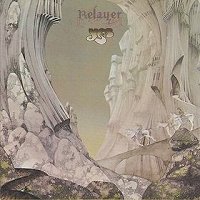 Jon Anderson wanted none less than Vangelis to replace Rick Wakeman, but it became clear after weeks of rehearsals that he would not fit into the band. Instead, the Swiss keyboardist Patrick Moraz, who earlier had been in Mainhorse and Refugee, joined the band. He had the right technical skills and size of his keyboard arsenal to be in Yes. And "Relayer" clearly showed that he was the perfect choice. Structurally, the album was similar to "Close to the Edge" as it consisted of a 20-minute suite on side 1, while the second side featured two 10-minute tracks. "The Gates of Delirium" is no less than a fantastic piece of music, an energetic orgy of all the best that symphonic progressive rock has to offer, featuring great melodies, grandiose and atmospheric arrangements and not at least some of the wildest, best, most complex and intense instrumental passages that Yes ever recorded. To make an ear-shattering finale to such an energetic piece would be pointless and impossible, so instead the band slowed it all down at the end and gave us four minutes of the most beautiful music and atmosphere of their career in form of the final part known as "Soon". Music won't get better than this. The energy level is maintained with "Sound Chaser" that opens the second side. This was probably the technically most breathtaking and difficult track the band ever wrote, and that says quite a lot. It's fast, quirky and has a freshness that few other progressive rock bands could rival. The nice and cosy "To Be Over" ends the album in a surprisingly harmonic and laidback way compared to the rest of the record, and has some of the feel of "Tales from Topographic Oceans" in it. "Relayer" is one of the strongest reminders of why Yes always will be remembered as one of the greatest and most defining progressive rock bands. Jon Anderson wanted none less than Vangelis to replace Rick Wakeman, but it became clear after weeks of rehearsals that he would not fit into the band. Instead, the Swiss keyboardist Patrick Moraz, who earlier had been in Mainhorse and Refugee, joined the band. He had the right technical skills and size of his keyboard arsenal to be in Yes. And "Relayer" clearly showed that he was the perfect choice. Structurally, the album was similar to "Close to the Edge" as it consisted of a 20-minute suite on side 1, while the second side featured two 10-minute tracks. "The Gates of Delirium" is no less than a fantastic piece of music, an energetic orgy of all the best that symphonic progressive rock has to offer, featuring great melodies, grandiose and atmospheric arrangements and not at least some of the wildest, best, most complex and intense instrumental passages that Yes ever recorded. To make an ear-shattering finale to such an energetic piece would be pointless and impossible, so instead the band slowed it all down at the end and gave us four minutes of the most beautiful music and atmosphere of their career in form of the final part known as "Soon". Music won't get better than this. The energy level is maintained with "Sound Chaser" that opens the second side. This was probably the technically most breathtaking and difficult track the band ever wrote, and that says quite a lot. It's fast, quirky and has a freshness that few other progressive rock bands could rival. The nice and cosy "To Be Over" ends the album in a surprisingly harmonic and laidback way compared to the rest of the record, and has some of the feel of "Tales from Topographic Oceans" in it. "Relayer" is one of the strongest reminders of why Yes always will be remembered as one of the greatest and most defining progressive rock bands.
Label
Yes - "Yesterdays" (Atlantic 1975)
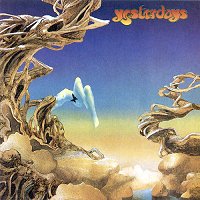 "Yesterdays" is basically a compilation of tracks from the two very first Yes albums. But Atlantic was of course wise enough to also include a couple of non-album tracks as bait. The version of Paul Simon's "America" was originally released as a single in 1972, but here we get the full-length 10-minute version in all its glory. It shows very well how a simple and light pop tune can be transformed into complex progressive rock. The other non-album track is "Dear Father" that originally was the b-side of the "Sweet Dreams" single. Its inclusion here will probably please completists most, as the song has a rather typical b-side quality and is really not all that good. The rest of the album consists of thoughtfully selected songs from the two first albums. The debut is represented with "Survival" and "Looking Around", while we get "Astral Traveller", "Then", "Sweet Dreams" and the title-track from "Time and a Word". "Yesterdays" will be a fine alternative if you want to get a glimpse of Yes in their earliest phase without having to buy both their two first records. But "America" makes it also worth having for others. And Roger Dean's cover art should also be counted as a bonus. "Yesterdays" is basically a compilation of tracks from the two very first Yes albums. But Atlantic was of course wise enough to also include a couple of non-album tracks as bait. The version of Paul Simon's "America" was originally released as a single in 1972, but here we get the full-length 10-minute version in all its glory. It shows very well how a simple and light pop tune can be transformed into complex progressive rock. The other non-album track is "Dear Father" that originally was the b-side of the "Sweet Dreams" single. Its inclusion here will probably please completists most, as the song has a rather typical b-side quality and is really not all that good. The rest of the album consists of thoughtfully selected songs from the two first albums. The debut is represented with "Survival" and "Looking Around", while we get "Astral Traveller", "Then", "Sweet Dreams" and the title-track from "Time and a Word". "Yesterdays" will be a fine alternative if you want to get a glimpse of Yes in their earliest phase without having to buy both their two first records. But "America" makes it also worth having for others. And Roger Dean's cover art should also be counted as a bonus.
Yes - "Going for the One" (Atlantic 1977)
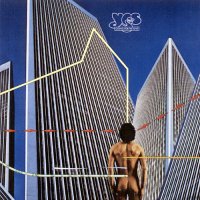 Patrick Moraz left Yes after the tour for "Relayer" and the band was again in search for a new keyboard-player. The replacement was surprisingly none other than Rick Wakeman himself, who had found himself in serious financial troubles after several expensive solo-projects and shows. With Wakeman back in the band, Yes made what I personally regards as their last classic album. The ugly Hipgnosis-cover and straightforward rock of the opening title-track may make you a little bit sceptical at first, but repeated listens reveals one of their finest albums. The 16-minute "Awaken" is Jon Anderson's personal favourite song by the band, and ranges up with tracks like "Heart of the Sunrise", "And You And I" and "The Gates of Delirium" as one of Yes' best moments. "Wonderous Stories" is a pleasant and lovely acoustic ballad has much of the same feel and atmosphere as "Your Move". The powerful "Parallels" would replace "Siberian Khatru" as their opening track in concerts in the late 70's. The majestic "Turn of the Century" is Yes at their most beautiful and symphonic. And as mentioned earlier in this review, the title-track is a hard rocking and simple track, but still very enjoyable and funny. The only unfortunate thing is that "Going for the One" proved to be Yes' last masterpiece. Patrick Moraz left Yes after the tour for "Relayer" and the band was again in search for a new keyboard-player. The replacement was surprisingly none other than Rick Wakeman himself, who had found himself in serious financial troubles after several expensive solo-projects and shows. With Wakeman back in the band, Yes made what I personally regards as their last classic album. The ugly Hipgnosis-cover and straightforward rock of the opening title-track may make you a little bit sceptical at first, but repeated listens reveals one of their finest albums. The 16-minute "Awaken" is Jon Anderson's personal favourite song by the band, and ranges up with tracks like "Heart of the Sunrise", "And You And I" and "The Gates of Delirium" as one of Yes' best moments. "Wonderous Stories" is a pleasant and lovely acoustic ballad has much of the same feel and atmosphere as "Your Move". The powerful "Parallels" would replace "Siberian Khatru" as their opening track in concerts in the late 70's. The majestic "Turn of the Century" is Yes at their most beautiful and symphonic. And as mentioned earlier in this review, the title-track is a hard rocking and simple track, but still very enjoyable and funny. The only unfortunate thing is that "Going for the One" proved to be Yes' last masterpiece.
Yes - "Tormato" (Atlantic 1978)
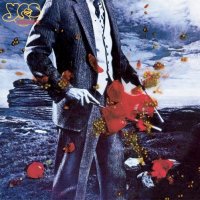 Yes released their last 70's album in 1978, and "Tormato" is easily their weakest effort from that decade. The first thing that can make you a bit suspicious is the fact that it includes no less than 8 songs. For me, one of the trademarks of classic Yes IS much about lengthy tracks and there's none of them here. Another bad thing about "Tormato" is Wakeman's obvious attempts at a more modern keyboard-sound; resulting in some REALLY horrible and ugly sounds, just check his passages in "Arriving UFO". And the production is plain awful. The hit-song "Don't Kill the Whale" was the closest Yes ever would come to disco in the 70's, and it says quite a lot that it's one of the better songs on the album. The opening-song "Future Times" is at least able to set the listener in a good mood with its cheerful melody and charm. "Madrigal" is a nice and short baroque-piece that is followed by the energetic "Release, Release". The latter song is probably an attempt at doing another song in the vein of the title-track from "Going for the One" but without succeeding very well. "Circus of Heaven" is a rather cheesy and infantile song, although not without some charm. "Onward" is the most atmospheric song on the album and includes some orchestration too. The closing-number "On the Silent Wings of Freedom" is the closest we come to a "lengthy" track on the album, and seems to be many people's favourite from the record. It features a lengthy instrumental intro with some very distinctive bass playing. Personally I find the vocal-section to be rather mediocre. "Tormato" is not essential Yes in any way, and you should have all their other releases from the 70's before you even think about getting this one. Yes released their last 70's album in 1978, and "Tormato" is easily their weakest effort from that decade. The first thing that can make you a bit suspicious is the fact that it includes no less than 8 songs. For me, one of the trademarks of classic Yes IS much about lengthy tracks and there's none of them here. Another bad thing about "Tormato" is Wakeman's obvious attempts at a more modern keyboard-sound; resulting in some REALLY horrible and ugly sounds, just check his passages in "Arriving UFO". And the production is plain awful. The hit-song "Don't Kill the Whale" was the closest Yes ever would come to disco in the 70's, and it says quite a lot that it's one of the better songs on the album. The opening-song "Future Times" is at least able to set the listener in a good mood with its cheerful melody and charm. "Madrigal" is a nice and short baroque-piece that is followed by the energetic "Release, Release". The latter song is probably an attempt at doing another song in the vein of the title-track from "Going for the One" but without succeeding very well. "Circus of Heaven" is a rather cheesy and infantile song, although not without some charm. "Onward" is the most atmospheric song on the album and includes some orchestration too. The closing-number "On the Silent Wings of Freedom" is the closest we come to a "lengthy" track on the album, and seems to be many people's favourite from the record. It features a lengthy instrumental intro with some very distinctive bass playing. Personally I find the vocal-section to be rather mediocre. "Tormato" is not essential Yes in any way, and you should have all their other releases from the 70's before you even think about getting this one.
Yes - "Drama" (Atlantic 1980)
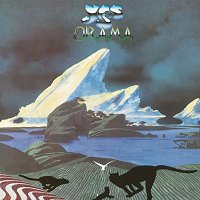 Yes was a band in ruins at the end of the 70's. Anderson and Wakeman were no longer in the group, and left Squire, Howe and White with a rather uncertain future. But the trio soon joined forces with The Buggles, a whimsical pop-duo consisting of Trevor Horn on vocals and Geoff Downes on keyboards. This short-lived line-up tried to fuse the old fashioned symphonic progressive rock that Howe & co. still favoured with the more contemporary pop-leanings of Horn and Downes. So it's not a big surprise that "Drama" turned out to be neither fish nor fowl. The ska-inflected "Tempus Fugit", the New Wave-tendencies of "Into the Lens" and the AOR/prog-bastard "Does it Really Happen?" sounded like desperate attempts at keeping up with the trends and fashions of the time. And on the other hand, they were equally desperate to convince everybody that this still was Yes. Horn did whatever he could to sound like Jon Anderson, and the cover was for the first time since "Yesterdays" designed by Roger Dean. But most "important" of all, they opened the album with the 10-minute "Machine Messiah". This complex epic sounded convincing at first listen, but closer inspection reveals that it has not much to offer in terms of good ideas and inspired songwriting. Yes without Jon Anderson can in my opinion never be Yes, and "Drama" ends up more like a parody than a real Yes-album. Yes was a band in ruins at the end of the 70's. Anderson and Wakeman were no longer in the group, and left Squire, Howe and White with a rather uncertain future. But the trio soon joined forces with The Buggles, a whimsical pop-duo consisting of Trevor Horn on vocals and Geoff Downes on keyboards. This short-lived line-up tried to fuse the old fashioned symphonic progressive rock that Howe & co. still favoured with the more contemporary pop-leanings of Horn and Downes. So it's not a big surprise that "Drama" turned out to be neither fish nor fowl. The ska-inflected "Tempus Fugit", the New Wave-tendencies of "Into the Lens" and the AOR/prog-bastard "Does it Really Happen?" sounded like desperate attempts at keeping up with the trends and fashions of the time. And on the other hand, they were equally desperate to convince everybody that this still was Yes. Horn did whatever he could to sound like Jon Anderson, and the cover was for the first time since "Yesterdays" designed by Roger Dean. But most "important" of all, they opened the album with the 10-minute "Machine Messiah". This complex epic sounded convincing at first listen, but closer inspection reveals that it has not much to offer in terms of good ideas and inspired songwriting. Yes without Jon Anderson can in my opinion never be Yes, and "Drama" ends up more like a parody than a real Yes-album.
Yes - "Yesshows" (Atlantic 1980)
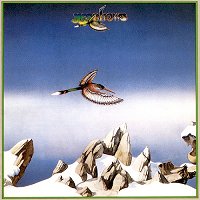 As most of you knows, Yes broke up for the first time in 1980 after the album "Drama" and the attempt at replacing Jon Anderson and Rick Wakeman with Trevor Horn and Geoff Downes. "Yesshows" was a double live-album released after the break-up, and consists of recordings from 1976 and 1978. The material is from the post-"Close to the Edge"-period (with the exception of "Time and a Word") and the album serves as a superb supplement to the live classic "Yessongs". The band is in top shape and delivers great performances of the material. "Parallels" sounds in my opinion better here than it did on "Going for the One" and the same goes for "Time and a Word" that works better without the messy orchestra on the studio-version. "The Gates of Delirium" is another demonstration of the fact that Yes was one of progressive rock's best live-bands. Most of the second LP is taken up of what I consider to be the ultimate version of "Ritual". The track is spread over both sides of the record and it kicks the ass off the studio-version on every level. If you have this album and "Yessongs" then you actually have all the live-stuff you'll need by Yes. As most of you knows, Yes broke up for the first time in 1980 after the album "Drama" and the attempt at replacing Jon Anderson and Rick Wakeman with Trevor Horn and Geoff Downes. "Yesshows" was a double live-album released after the break-up, and consists of recordings from 1976 and 1978. The material is from the post-"Close to the Edge"-period (with the exception of "Time and a Word") and the album serves as a superb supplement to the live classic "Yessongs". The band is in top shape and delivers great performances of the material. "Parallels" sounds in my opinion better here than it did on "Going for the One" and the same goes for "Time and a Word" that works better without the messy orchestra on the studio-version. "The Gates of Delirium" is another demonstration of the fact that Yes was one of progressive rock's best live-bands. Most of the second LP is taken up of what I consider to be the ultimate version of "Ritual". The track is spread over both sides of the record and it kicks the ass off the studio-version on every level. If you have this album and "Yessongs" then you actually have all the live-stuff you'll need by Yes.

|